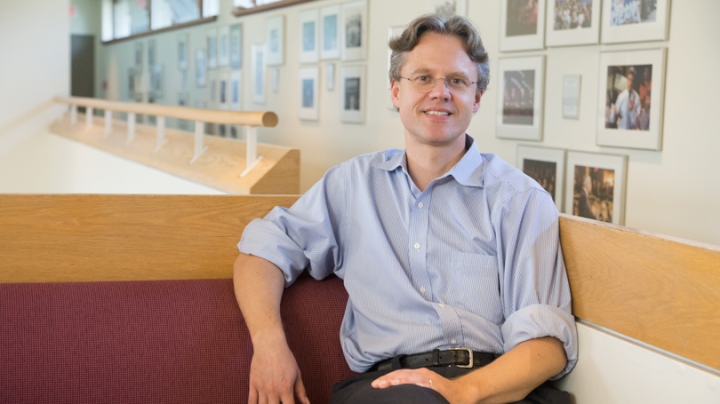This is the seventh in a series of profiles of the new endowed professors in the arts and sciences.
Erzo F.P. Luttmer, the Dartmouth Professor in Economics
A microeconomist, Erzo Luttmer studies social insurance programs such as Medicaid and Social Security. Born in the Netherlands, he came to the United States to earn his PhD at Harvard, where he met his wife and adopted her country—becoming a U.S. citizen in 2004. Following appointments at the Harris School of Public Policy at the University of Chicago, the World Bank, and Harvard’s John F. Kennedy School of Government, he joined the Dartmouth economics department in 2010.
What being named to this professorship means:
When (Dean of the Faculty) Michael Mastanduno called me, I was expecting that he was going to ask me to serve on a committee. This was a very pleasant surprise! It’s a tremendous privilege and honor. It recognizes my research, my teaching, and my contributions to the Dartmouth community.
Current research interests:
One project is trying to evaluate how valuable in dollar terms it is to Medicaid recipients to receive Medicaid. That might strike you as a basic question that economists should have answered long ago; it turns out to be very challenging. My co-authors and I have produced what we think is a better estimate than has been produced before, and we’ve started presenting our working paper at different universities to collect feedback. I’m also working on a project with Andrew Samwick on how much people mind not knowing for sure how much Social Security benefits they’re going to get in the future. Economists have been good at calculating the risk premium of uncertainty of holding stocks, and assets like that, but they’ve never done this for uncertainty in government benefits. Uncertainty imposes a substantial but unseen cost on individuals that government does not take into account.
Why microeconomics is fun:
The fun part is when you figure out new stuff—like how to calculate the value of Medicaid for recipients—and when you combine insights from different contexts and get unexpected results and try to figure out what’s going on. It has the feel of doing puzzles, but for real questions, so it’s not just an exercise. And what really makes this fun is working with co-authors who are engaged and smart.
On teaching:
What makes teaching at Dartmouth rewarding is that the classes are small and the students are smart and engaged, and you can have a back-and-forth. That’s not easy to come by. I also typically hire one or two undergraduate research assistants. It’s very valuable to the undergraduates that we don’t have a graduate program that crowds out opportunities for them.
Why Dartmouth:
I like the lack of traffic jams, the sense of community, the excellent school system, the opportunities to hike and ski—to have a pleasant summer and a decent amount of snow in the winter. And the key for me is really the environment in the economics department. It’s very collegial—people’s doors are open, and we talk about economic research, but also our personal lives. And because we don’t have a PhD program, we don’t need to hire as broadly in as many subfields of economics, and as a result we can have a large number of people who are relatively close in the type of work they do. You have a greater critical mass of relevant colleagues, and that’s very rare. I think it has great benefits.
The Endowed Chairs
Since 1787, Dartmouth has recognized its top faculty with named professorships. These chairs—traditionally supported through endowed gifts from alumni, family, and friends of the College—honor faculty whose scholarship, teaching, and service exemplify Dartmouth’s core mission.
“Endowed professors reflect the best of Dartmouth,” says Dean of the Faculty Michael Mastanduno. “These scholars are not only at the top of their respective fields—they are generous and committed teachers and outstanding citizens of the College community.”
This year, 10 members of the Faculty of Arts & Sciences have been appointed to endowed chairs. In addition, the Tuck School of Business appointed Praveen Kopalle the Signal Companies’ Professor of Management; and Rahul Sarpeshkar joined the faculty this year as the inaugural Thomas E. Kurtz Chair in the William H. Neukom Academic Cluster in Computational Science, with a primary appointment at Thayer School of Engineering.


